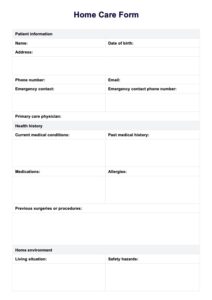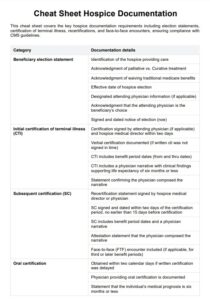Navigating the world of home health care can feel overwhelming, especially when you’re trying to ensure everything is in order for a loved one’s well-being. Whether you’re a family seeking professional assistance or a care provider looking to formalize your services, having a clear agreement in place is absolutely crucial. It sets the stage for a positive and professional relationship, defining expectations and safeguarding the interests of everyone involved.
A well-drafted contract isn’t just a formality; it’s a foundational document that brings clarity, prevents misunderstandings, and offers peace of mind. It outlines the scope of care, financial arrangements, responsibilities, and much more, acting as a guide throughout the care journey. That’s why understanding and utilizing a robust home health care contract template is an excellent starting point for anyone involved in this important service.
What Should Be Included in Your Home Health Care Contract?
When you’re dealing with something as personal and vital as home health care, a good contract acts as your blueprint. It details every aspect of the arrangement, leaving no room for guesswork. Think of it as a comprehensive agreement that protects both the client receiving care and the provider delivering it. This foundational document ensures that everyone is on the same page from day one, fostering trust and a clear understanding of expectations.
First and foremost, the contract needs to clearly identify all parties involved: the client receiving care, the person responsible for payments (if different from the client), and the home health care agency or individual provider. It should meticulously describe the specific services to be provided. Are we talking about skilled nursing, personal care assistance, medication management, meal preparation, or companionship? Precision here prevents future disputes and ensures the client receives the exact care they need.
Financial transparency is another non-negotiable component. The contract must detail the cost of services, the billing cycle, acceptable payment methods, and any late payment penalties. It should also specify how rate changes will be communicated and implemented, ensuring there are no surprises down the line. This section is vital for maintaining a healthy business relationship and avoiding financial strain for either party.
Beyond the basics, a comprehensive home health care contract template will also outline the schedule of services, including specific days and times. It should address procedures for rescheduling appointments, emergency protocols, and how to handle unforeseen circumstances. Clarifying these operational aspects from the outset helps maintain continuity of care and minimizes disruption for the client.
Finally, consider clauses related to confidentiality, privacy, and dispute resolution. These elements are critical for protecting sensitive client information and providing a clear path forward should any disagreements arise. A well-defined termination clause is also important, outlining the conditions under which the agreement can be ended by either party and the required notice period. This ensures a professional and orderly conclusion to the service when necessary.
Key Sections to Prioritize
- Client and Provider Identification: Full legal names, addresses, and contact information for all parties.
- Scope of Services: A detailed list of all tasks and services the caregiver will perform.
- Schedule and Hours: Specific days, times, and duration of care.
- Compensation and Payment Terms: Hourly rates, billing frequency, payment methods, and late payment policies.
- Caregiver Responsibilities: Duties, professional conduct expectations, and reporting procedures.
- Client Rights and Responsibilities: Expectations of the client, including cooperation and providing a safe environment.
- Confidentiality and Privacy: Agreement to protect personal and medical information.
- Emergency Procedures: Steps to take in case of a medical emergency or other urgent situations.
- Termination Clauses: Conditions and notice requirements for ending the agreement.
- Governing Law: Specifies which state’s laws will govern the contract.
Customizing Your Contract for Specific Needs
While a home health care contract template provides an excellent framework, it’s crucial to remember that it’s just a starting point. Every individual receiving care is unique, with distinct needs, preferences, and circumstances. Therefore, the most effective contract will be one that has been carefully customized to reflect these specific details, rather than a generic, one-size-fits-all document. Taking the time to tailor your agreement ensures it truly serves the client’s best interests and the provider’s operational realities.
Consider the level of care required. A template designed for basic companionship might not adequately address the complexities of skilled nursing care for a client with advanced medical needs. You might need to add specific sections detailing medical equipment usage, wound care protocols, medication administration schedules, or specialized dietary requirements. The more detailed and specific these elements are, the clearer the expectations become for everyone involved.
Another important aspect of customization involves outlining communication preferences and emergency contacts. Who should be notified in case of an issue? How often should updates be provided to family members, and through what channels? These seemingly small details can significantly impact the quality of care coordination and provide immense reassurance to concerned family members.
Finally, it’s always a wise decision to have any customized home health care contract template reviewed by a legal professional. While templates are helpful, laws regarding home health care services, liability, and employment can vary by state and even locality. A legal expert can ensure your contract is not only comprehensive but also legally sound and enforceable, protecting all parties from unforeseen complications down the road.
A well-defined contract is a cornerstone of successful home health care, fostering clarity, trust, and mutual respect between clients, families, and providers. It acts as a living document that can evolve with changing needs, providing a stable foundation for what is often a sensitive and personal relationship. By investing time in creating a thorough and customized agreement, everyone involved can focus on what truly matters: delivering and receiving the best possible care.


